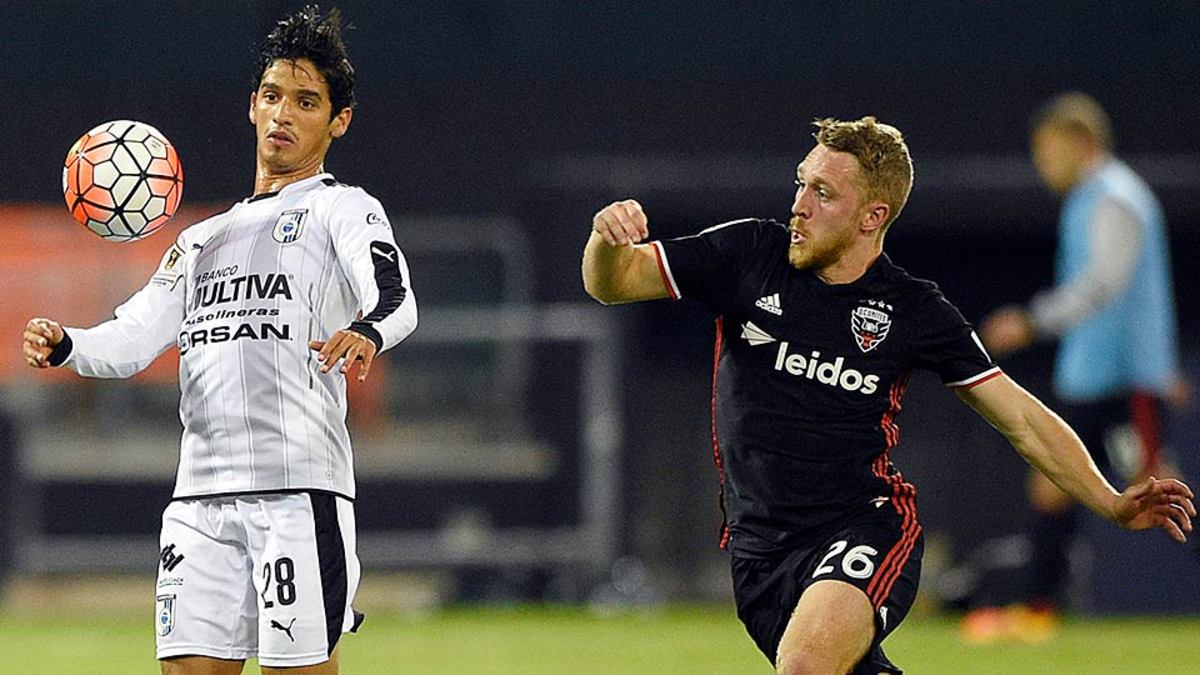Quality, depth of MLS teams still far behind competition in CCL
WASHINGTON — Fifteen minutes before kickoff on Tuesday evening, D.C. United and Querétaro settled whatever differences may have lingered following the alleged locker-room theft during last week’s CONCACAF Champions League quarterfinal opener in Mexico. Less than four minutes after kickoff, the two-game series was settled as well.
You usually can bet on two things when the CCL knockout rounds roll around each February: controversy and MLS frustration. As this season’s quarterfinals unfold, it’s becoming increasingly apparent that Montreal’s run to the 2015 finals was an aberration rather than a sign of victories to come. Mexican clubs are too deep in talent and too deep into their season to fall short against MLS opponents in preseason form.
MLS coaches, executives weigh in on promotion, relegation
Only three MLS clubs have defeated a Mexican foe in a home-and-home series. United’s bid to become the fourth was damaged with a 2–0 defeat last week in Querétaro and ended with Tuesday’s 1–1 draw at RFK Stadium. In reality, it was over in the fourth minute, when Ángel Sepúlveda took advantage of a mix-up between two D.C. defenders and finished off a teammate’s header from eight yards away.
Thanks to Querétaro’s away goal, a low-scoring D.C. squad playing only its second competitive game since early November needed four to advance. It wasn’t going to happen.
“It changes everything,” United coach Ben Olsen said of Sepúlveda’s strike.
“We shot ourselves in the foot,” defender Taylor Kemp added. “We knew we couldn’t give up a goal. We gave one up in three minutes. It makes it really easy for them.”
United pulled one back on a spectacular 84th-minute blast from rookie midfielder Julian Buescher, saving the hosts the indignity of a shutout on home soil.
But by that point, D.C. and the 10,790 in attendance were already looking toward Sunday’s MLS regular-season opener in Los Angeles. For the most part, that’s what these CCL series have become for MLS clubs: a more rigorous way to prepare for the eight-month MLS gauntlet. For the rest of us, they're a good source for strange storylines.
“These experiences are great. Taking a team down to Mexico, playing in CONCACAF, coming back here and going through the aggregate system, it’s all great,” Olsen said. “That’s how we learn. We go through these events and I think we’re much better for having played these two games then playing two games in the Charleston Cup, that’s for sure.”
Paunovic brings unique experience, style to Chicago Fire's reboot
MLS teams have been getting closer—slowly.
Montreal became the first to defeat to Latin American opponents in the same tournament last year, and at the conclusion of Tuesday’s game in Washington, only one of the 13 MLS vs. Liga MX series played over the past four CCL seasons was decided by more than two goals.
There were some routs before that.
Querétaro coach Víctor Manuel Vucetich, who won the CCL three times while managing Monterrey, said that MLS has “grown and advanced a lot” and that it’s now “more important to use our entire squad to overcome an MLS team, without a doubt.” He also conceded that “there is definitely an advantage in having that rhythm,” for Liga MX clubs that are nearly two months into their seasons.
But the gap remains far from closed. Mexican teams have better benches and more quality up front. They finish the chances they need to finish, while MLS clubs too often are left lamenting wasted opportunities. That was the difference in the D.C.-Querétaro quarterfinal. United wasn’t outplayed. It managed last week's game well before tiring in the closing minutes, which was expected at this time of year at an altitude of 6,000 feet. And D.C. put the visitors under pressure for significant stretches on Tuesday. Overall, United outshot Querétaro, 33–27, over the two legs. D.C. had more shots on target and more corner kicks but it couldn’t finish. On Tuesday, Chris Rolfe missed a second-half penalty kick and Fabián Espíndola nearly scored twice in the 53rd.
USA's Sunil Gulati plays pivotal role in FIFA election outcome
“From a stats standpoint, the game looks pretty good,” Olsen said. “I’d love to play them in another series. I think we’re just as good a team as they are right now, no disrespect to them. The ball bounces our way a little bit better and maybe we’re through. But we’re not and give them credit.”
Silver linings, explanations, regrets or excuses remain the common takeaway from these CCL series for MLS hopefuls.
U.S. and Canadian teams still lack the quality, consistency, depth and fitness to handle Mexican opposition, and they’re unable to take advantage of playing at home. The story that emerged Monday concerning the theft of cell phones and cash from at least four D.C. players during last week’s opener in Querétaro, while uncommon, likely didn’t shock anyone. Strange things happen on the road in CONCACAF, and MLS teams can't compensate when hosting. In a statement, Querétaro denied the thefts took place at the Estadio Corregidora but still pledged to reimburse the affected parties. Before Tuesday's game, the teams sent out a tweet reading, “We're moving past unfortunate events and are focused on our match tonight.”
The small issue may have been settled, but the bigger one isn’t. MLS remains a long way from feeling welcome in CONCACAF competition, which was made even more clear later Tuesday with the LA Galaxy’s 4–0 loss and elimination at Santos Laguna. It will be up to the Seattle Sounders and Real Salt Lake to save the league’s blushes on Wednesday.





